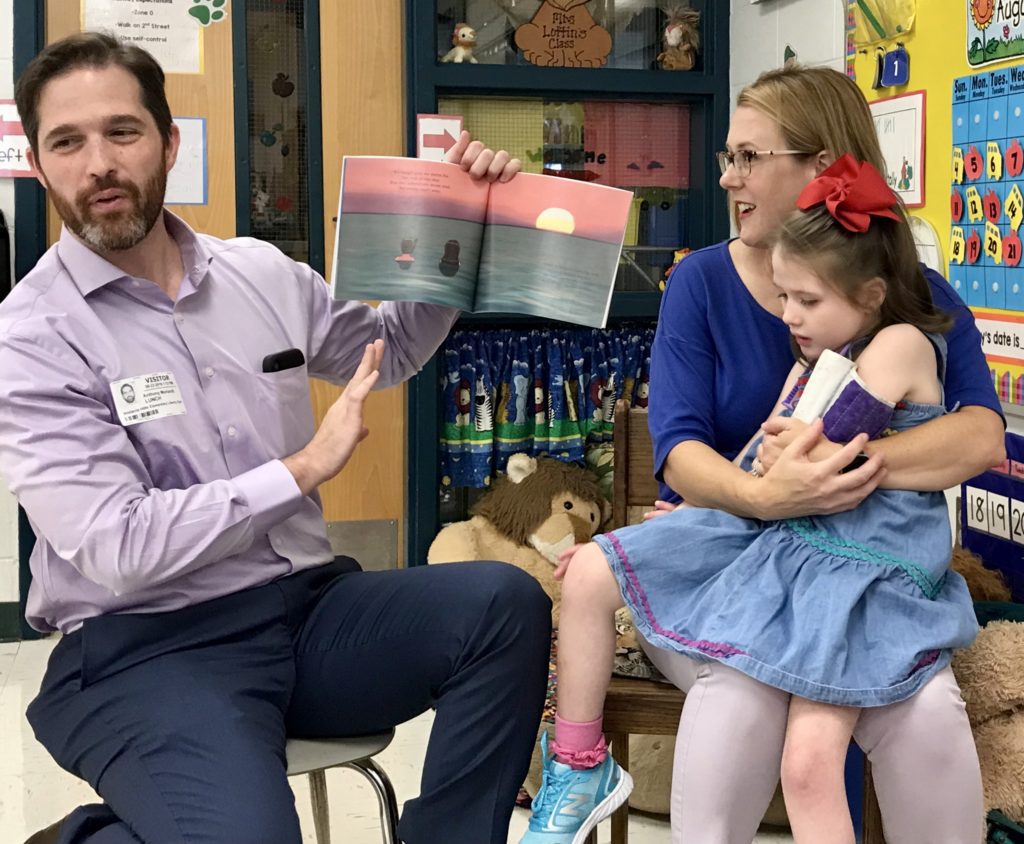
“Three Momma!” my daughter pleads, holding three large picture books in her tiny hands. Her hair is still wet from her evening bath, and she smells lightly of lavender as I pull her into my lap in the white rocker gone dingy after serving four babies. Settling in to read books, we are on the final stretch of the nighttime race to bed. Dinner has been cooked, served, and picked at by finicky children. Baths have been taken–joyfully by the younger set, begrudgingly by the preteens. Pajamas are on, teeth have been brushed, and lovies have been found. Now we have arrived at story time. But first there is a debate.
“Now Grace,” I begin wearily, “you know the rules. Two books, not three. Then one song, then prayers.”
“No more arguing,” I add as my youngest, age four, chooses her usual: Fancy Nancy. After reading, singing, and prayers, Grace is tucked in bed. Closing the door to her room, I retrieve my own book to snuggle under the covers of my own bed with a cup of chamomile tea. If I have enough bandwidth at the end of this very long day, I will invite my two oldest to join me with their books, all of us snuggled together.
The Power of Books
Lately I’ve been pondering the power of books, specifically books that enlighten us to a people group or human experience we might not encounter in our day-to-day lives. Currently my bedside table is stacked with memoirs. A few I’ve read lately include:
- The Glass Castle by Jeanette Walls,
- When Breath Becomes Air by Paul Kalanithi,
- The Sound of Gravel by Ruth Wariner, and
- The Sun Does Shine: How I Found Life and Freedom on Death Row by Anthony Ray Hinton.
These stories have allowed me to enter the world of the author, taking on their perspectives. Memoirs flex my empathy muscles.
My Journey
As a mother to a profoundly disabled daughter, I often find myself hungry for empathy. After Luisa’s diagnosis I was starved–even ravenous–for others to empathize with the radical shift in our family’s life. Now five years later, I find myself craving less empathy for myself and more for her. And if empathy is not “I feel sorry for you,” but rather, “I am attempting to understand what it must be like to be in your shoes,” then how can other children and adults learn empathy for a child with limitations they have never experienced personally?
There is a vulnerability when I wheel my daughter out into society away from our protective and loving home. Little children, their growing minds curious, stare at Luisa in her wheelchair as she makes unusual and loud sounds. I like to watch these children as they study my beautiful daughter. Their eyes are wide and serious, an obvious display of inward intelligence as their minds work to figure out this sight before them. For their mother, this is a crucial moment, an opportunity to shepherd their child from simple curiosity into empathy towards another. It’s an opportunity to go from, “What is wrong with her?” to “What must it be like to be Luisa?”
Teaching Our Children Empathy Through Books
Children can learn empathy, and the most powerful teachers are their own parents. Where does a parent start when teaching empathy? Perhaps great lessons can be taught in humble rocking chairs. Perhaps it is more simple than we thought. Could it be as simple as a children’s picture book read just before bedtime?
Here are six books that have generated great discussion in our family regarding disability. These books serve as tools to start greater conversations with your little ones about disability. If your child knows someone with a disability or differences, it would be powerful to name that person before you begin reading these books. This ties your child’s real-life exposure to the printed page.
The Rabbit Listened by Cori Doerrfeld
Empathy Lesson: Sometimes the best way to be a friend is just to listen and not leave.
Ask Your Child: Has your friend with differences ever been sad or frustrated? Why do you think they feel that way? How can you stay and be a good listener to your friend?
Favorite Quote: “Through it all, the rabbit never left.”
You are Special by Max Lucado
Empathy Lesson: No matter what the world thinks, there is Someone who cherishes you, just as you are.
Ask Your Child: Do you know someone who does not run or walk or read as well as you? Is there something you struggle with doing well?
Favorite Quote: “‘Remember,’ Eli said as the Wemmick walked out the door, ‘you are special because I made you. And I don’t make mistakes.’”
The Adventures of Bug and Boo Under the Sea by Denay Hooks
Empathy Lesson: All children, even though they look and act differently, love a good adventure!
Ask Your Child: What kind of adventure would you like to go on? Who would you take on your adventure? What kind of adventure do you think your friend might want to go on?
Favorite Quote: “So remember, my friends, to include everyone. You too can help others to explore and have fun!”
We’re All Wonders by R.J. Palacio
Empathy Lesson: Everyone is different, and everyone is a wonder.
Ask Your Child: Do you know anyone who looks a little different? How do you look different than other people? How can we show kindness to everyone we meet?
Favorite Quote: “I know I can’t change the way I look. But maybe, just maybe . . . people can change the way they see.”
My Brother Charlie by Holly Robinson Peet and Ryan Elizabeth Peete
Empathy Lesson: Even those who are not able to speak can express love.
Ask Your Child: Do you know anyone who cannot speak with their mouths? How do you think they say, “I love you” to someone? How do you say, “I love you” to someone?
Favorite Quote: “I have learned from Charlie that love doesn’t always come from what you say. It can also come from what you do.”
The Black Book of Colors by Menena Cottin
Empathy Lesson: There are some people who experience the world differently.
Ask Your Child: Do you know anyone who cannot see or hear? What things can they do? Have you ever thought about how an object feels and smells, rather than just how it looks?
Favorite Quote: “Red is sour like unripe strawberries and as sweet as watermelon. It hurts when he finds it on his scraped knee.”
Remembering Our Calling
So perhaps tonight when it is time for bed I will permit Grace just one more book, knowing that a well-chosen book expands her vision, growing empathy in her heart. I would do well to slow down a bit on that rush to tuck her into bed. We mamas would do well to remember this part of our great calling:











